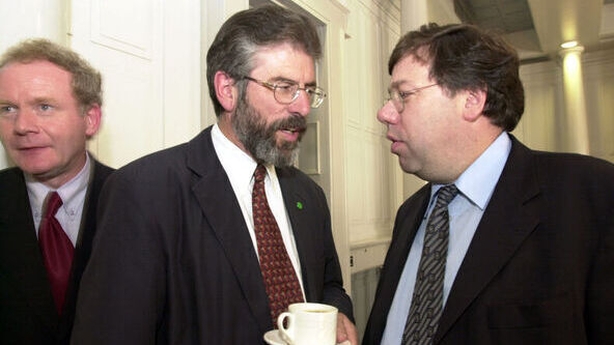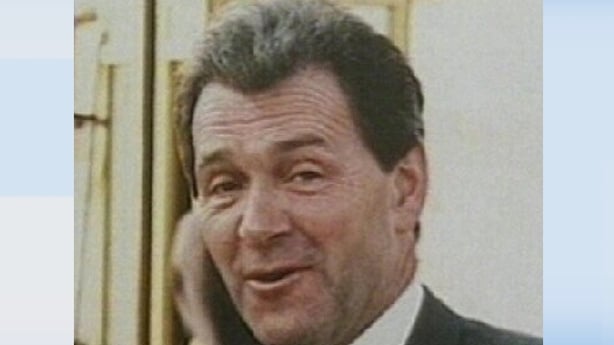By David McCullagh and Fiachra Ó Cionnaith
IRA involvement in criminality caused continuing difficulties in the peace process throughout 2004 and caused at least one blazing row between Sinn Féin and Irish government ministers, newly released documents show.
The year got off to a difficult start, with the attempted kidnapping of dissident republican Bobby Tohill putting IRA criminality in the spotlight.
Tohill was abducted from a Belfast bar on 20 February, but police intercepted the kidnappers and arrested them, they later skipped bail and went on the run.
More significantly, PSNI Chief Constable Hugh Orde blamed the IRA for the operation.
This led the DUP to demand the exclusion of Sinn Féin from talks on the review of the Good Friday Agreement.
Ian Paisley Jr accused the two governments of being "scared of the Provos".
He said the DUP wanted to make a deal, but the governments would make that impossible "if they insisted that Sinn Féin must stay in, irrespective of what the republican movement did".

In fact, the Irish Government was severely critical of the republican movement, both publicly and privately.
In the media, minister for justice Michael McDowell even compared Sinn Féin to the Nazis.
His attacks were deeply resented by Sinn Féin.
Martin McGuinness complained to minister for foreign affairs Brian Cowen in February that Mr McDowell’s "irresponsible comments" were being used by unionist opponents of the Good Friday Agreement to try to exclude Sinn Féin from the process.
The row boiled over in an extraordinary confrontation between Sinn Féin and the Irish government in Belfast in March 2004.
The minutes of the meeting were written in the restrained style of civil servants, but they still show the anger and bitterness between the two sides.
Gerry Adams kicked off the row by complaining that the government was trying "to undermine Sinn Féin by criminalising it".
"He was not concerned about the normal cut and thrust of politics but personally resented being depicted as a criminal."
Mr Adams then started reading from newspaper reports which quoted government sources saying republicans were involved in criminal activities.
Read more:
Netanyahu lobbied for Dublin embassy, State Papers show
Weapon manufacture proposals rejected by separate govts
Gerry Adams pushed for US visa to allow fundraising
Iran offered 'secret meeting' to help free Brian Keenan
State Papers: Six more things we learned
Taoiseach Bertie Ahern denied there was a strategy to undermine Sinn Féin - but he said the newspaper report Mr Adams quoted was accurate.
"He knew the details, in particular the involvement of the Belfast Provisional IRA."
This led to what the minutes refer to as "sharp exchanges", leading Brian Cowen to tell the Sinn Féiners to "show some respect to the taoiseach".
At this point, Michael McDowell weighed in, supporting the claim that there was ongoing criminality and addressing the Sinn Féin leaders directly.
"I know it and you know it. Don't try and cod me."
Mr McGuinness said he didn’t know what Mr McDowell was talking about, and there were "further robust exchanges" (civil servant speak for a furious row) between Mr McDowell, Mr Adams and Mr McGuinness.
Mr Cowen then claimed Sinn Féin had accused Fianna Fáil of corruption, a claim Mr Adams denied.
Mr Ahern said he had no doubt about what Gerry Adams had said about his party and "outlined several instances of Sinn Féin misbehaviour".

But despite this rancorous meeting, the government still needed Sinn Féin to make the peace process work, and recognised that keeping them on board might come at a cost.
Perhaps the most painful concession the government was being asked to make by Sinn Féin was to release the four IRA members convicted of the killing of Garda Jerry McCabe in Adare in 1996.
Sinn Féin had consistently claimed they should be released under the terms of the Good Friday Agreement, the Government had rejected this argument, fighting it all the way to the Supreme Court, and winning the argument.
However, as part of an overall deal which would see an end to all IRA activity, the government had to consider Sinn Féin’s insistence that the four men should be released.
When news of this leaked in mid-2004, Mr McDowell had the difficult job of defending a policy he clearly had doubts about.
This comes through in a letter he wrote in June 2004 to Anne McCabe, widow of the murdered garda.
He insisted that releases would only be considered in the context of a total end to the conflict, and of "the complete and permanent ending of all aspects of IRA paramilitary and criminal activity".
"I [McDowell] very much realise that what I am relating to you is of small comfort to you in your continuing great loss. I trust you will be able to see that the Government’s objective is nothing short of the realisation of lasting peace on the island of Ireland," the letter said.
In fact, the four men were not released until they had served their sentences in full, between 2007 and 2009.
The government also resisted pressure from Sinn Féin to extend a scheme for republicans on the run to individuals suspected of involvement in the Adare robbery.
2004 ended as it began. At a meeting in Belfast in December, Tony Blair’s chief of staff Jonathan Powell made a vague reference to being worried about the IRA and "aspects of criminality".
What he may have known, but the Irish officials did not, was that overnight a gang of armed men had stolen £26.5 million in cash from the Northern Bank, a robbery widely blamed on the IRA.
The issue of criminality had not gone away and would continue to dog the peace process the following year.
[Based on documents in 2024/71/100, 2024/71/106, 2024/71/133, 2024/71/162 and 2024/112/1]

